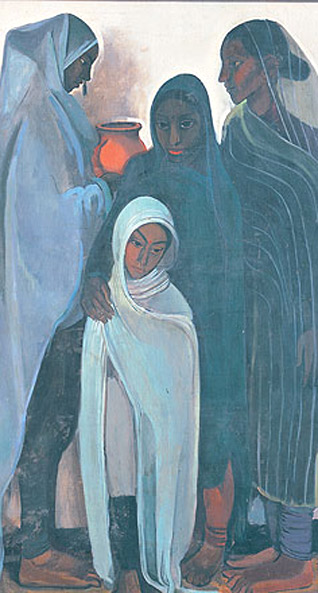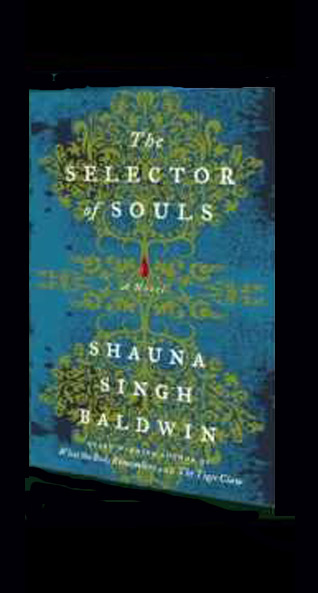Books
Shauna Singh Baldwin's The Selector of Souls
A Book Review by ROSALIA SCALIA
In her lyrical and lushly-detailed new novel, The Selector of Souls, best-selling and award winning author Shauna Singh Baldwin explores with unblinking honesty the challenges women endure.
The books opens with a grandmother -- Damini -- a mid-wife, making an onerous sacrifice out of love for her daughter whose third child too is born a daughter in a society that values sons more. The sacrifice haunts the book and represents one of the many unexpected, unwanted, unthinkable choices thrust upon women who must safeguard and care for their dependents.
The other character -- Anu -- flees an abusive marriage into the Catholic church, and when the two women cross paths in a Gurkot village, they each believe they are acting in the best interest of the women around them.
Baldwin’s two main characters -- Damini and Anu -- demonstrate inner strength and creativity. Although their approaches to the same issues remain different, each woman’s greatest strength is not endurance so much as action.
The book explores the courage required to take action -- either constructive or destructive action -- when dealing with issues such as domestic violence, infanticide, pre-birth gender-selection, equality, religious fanaticism, and traditions detrimental to a girl’s and a woman’s existence, among others.
“For me this book is a meditation on creation and destruction. We all have both -- the power to create and destroy – and are not as pure as the driven snow,” Shauna Singh says of the book that began coming to her in flashes in 2005. “It becomes a question of what part of yourself you will feed.”
Damini, a widow who weaves between the Hindu and Sikh world, faces an uncertain future, despite her age because tradition dictates she must live with a married son and the great taboo of living with or taking from a married daughter.
Mem-saab, an elderly, wealthy Sikh woman, becomes marginalized by her son, who covets her wealth and her home, taking over her possessions without permission.
Anu, a Hindu-Christian, believes she has safely disappeared into the Catholic Church, only to learn that her abusive husband is using his influence, power and money to keep tabs on her.
Anu’s cousin Rano, another character confused by both Hindu and Sikh influences, lives in Canada and faces gender-based job woes such as discriminatory pay scales and lack of career advancement, while, Sister Immaculata, an Irish-Catholic sister living and working in India, functions under the thumb of the archbishop and the male-dominated church hierarchy, often to impractical and unrealistic ends.
In their struggle to survive, each woman finds creative ways to maintain the fiction of traditions, while implementing solutions that may or may not upset the status quo.
The story, which spans from October 1994 to October 2005, also includes a cast of interesting male characters, each playing vital roles in the lives of the women around them.
Dadu, Anu’s father, encourages and supports Anu’s ability to think independently and her right to self-determination. Dadu stands in direct opposition to his brother-in-law and Anu’s Uncle Sharad, dutiful to a fault and thus blind to the reality around him. He fails to imagine that his niece is in deep trouble with her marriage, fervently wanting for Anu to return it.
Amanjit, the Sardar entrusted to care for his aged mother, treats her like an object instead of as a person.
Anu’s husband Vikas justifies beating Anu and blames his violence on her failure to bear sons, while Damini’s son-in-law -- Chunilal, the family’s wage earner, grows too ill to work but believes with conviction that women are unable to farm and that the birth of his daughter is a mistake.
He is blind to the fact that his wife, daughter and mother-in-law have been doing exactly that to assure the family’s survival.
Shauna Singh also explores issues the impact of one’s name on identity, survival and even status in life. Her characters examine what it means to name, withhold a name, to claim, or not, and even asks who has named the gods. Does it become easier to disown or not claim, to deselect or even kill the unnamed?
Yet, the character of a goddess who names everything herself lacks a name.
The book is filled with dark humor, and the characters in The Selector of Souls become so real, it’s difficult to leave them behind at the final page. Because Shauna Singh does not shy away from difficult situations, from horror or harsh realities, her vivid detail, polished, lyrical and sensual language, chronicles those realities and lures readers into a rich, multicultural world.
This book must rank at the top of everyone’s reading list. It illuminates the matters that foster confusion, misunderstandings, hurt feelings and physical pain between men and women, between people of various faiths and cultures, between the classes, between parents and children, between neighbors and friends.
From its opening with Damini’s haunting sacrifice to its very end, the book consistently surprises and keeps the reader gripped for what comes next.
September 25, 2012




